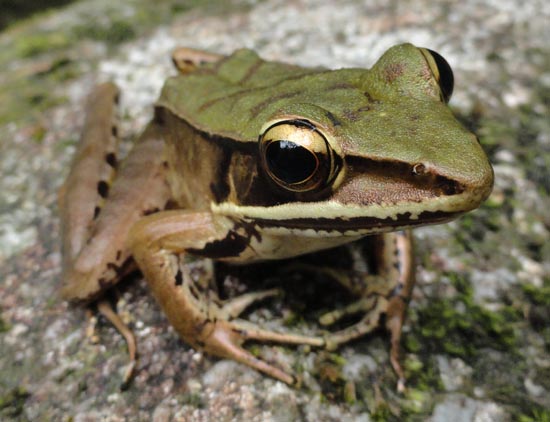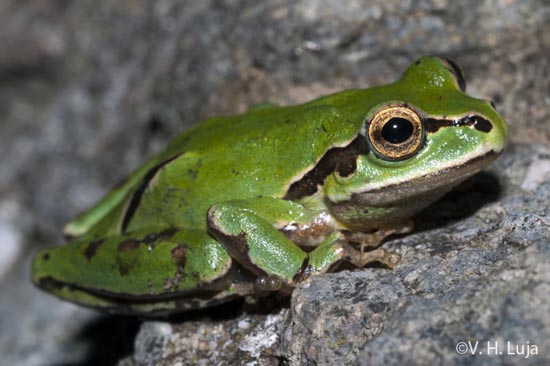Just before Save The Frogs Day 2016, SAVE THE FROGS! Founder Dr. Kerry Kriger was interviewed by Alison Cole on the Animal Voices radio show, western Canada’s only radio program on animal advocacy and compassionate living. Frogs and other amphibians are crucial to the health of our planet and we can all do more to protect them from extinction.
Below is a summary of the radio show’s key points.
Frogs face an uncertain future
Although everyone is familiar with frogs, we can easily forget their important role in our planet’s history. As Dr. Kriger explains, frogs have been around for hundreds of millions of years and, today, can be found almost anywhere on Earth due to their versatile adaptations. Since their appearance on this planet, they have survived several natural events that led to the extinction of other creatures, including the dinosaurs.
People may believe that amphibian populations will remain abundant into the future, but Dr. Kriger warns against that misleading misconception. Amphibians are in fact facing dire threats, including particularly destructive human activities. Pollution, infectious diseases, habitat loss, invasive species, climate change, and over-harvesting for the pet and food trades are just some of the dangers.
Fossil records indicate that throughout the history of amphibians on the planet, around one species of frog became extinct every 500 years. However, in the past few decades around 200 species have become extinct – almost without anyone noticing. These shocking facts should serve as an alarm call for anyone who cares about having a healthy planet. Thankfully, we have the ability to alter our habits and decrease our impact on these human-exasperated threats.
Why we should care
If frogs disappear, the impact on our world will be dramatic. Dr. Kriger summarizes the many ways frogs contribute to the environment — some more well-known than others. For example, frogs are an important part of the food web, most notably eating insects that carry deadly diseases to humans.
Their predatory instincts aren’t the only benefit to humans. Due to the permeability of their skin, amphibians are susceptible to environmental pollution, making them important bioindicators. If there aren’t many frogs, one of the first questions a biologist may ask is, “What’s wrong with the water?” Perhaps a lesser-known benefit is the contribution of amphibians to medical research. Many chemical qualities of amphibians have given researchers the key to some of humanities most important medical advances like pregnancy tests and antiobiotics. Dr. Kriger also reminds listeners of the general affection that many societies have for frogs, connecting us with the natural world.

Time for action, not pessimism
Although frogs face many dangers, Dr. Kriger reminds listeners that much can be done to ensure a bright future for amphibians. Since 2008, SAVE THE FROGS! has been at the forefront of efforts to protect populations around the world.
The annual Save The Frogs Day in April has been a huge success. Since its onset, more than 1,200 events have been held in more than 57 countries. This volunteer-driven conservation initiative has enabled people to inform and educate their communities, getting them actively involved in protecting the environment.
Dr. Kriger also talks about the many other projects that SAVE THE FROGS! runs throughout the year. Dr. Kriger encourages all amphibian enthusiasts to organize a Save The Frogs Day event in their community.
SAVE THE FROGS! takes pro-active educational and legal measures when frogs and other amphibians are faced with imminent threat. For example, when developers were planning to build apartments in Fort Erie, Ontario, Canada, SAVE THE FROGS! realized this would threaten one of Canada’s few remaining habitats of the Fowler’s Toad (Bufo fowleri). SAVE THE FROGS! conducted a campaign to educate the community and government officials about what was happening and the development project was eventually cancelled, saving the toad population.
Further afield, SAVE THE FROGS! is still hard at work. For instance, in West Africa around 90 percent of the rainforests have been destroyed which represents a tremendous danger to amphibians and other animals. In Ghana, members and supporters of SAVE THE FROGS! have given presentations in schools and training in universities so that local habitats can be restored and amphibians protected.
These are a few examples that highlight the all-inclusive approach that SAVE THE FROGS! adopts when working around the world. While Dr. Kriger conducted his Ph.D. research in Australia he was struck by how little information about the amphibian declines was spreading outside scientific circles. He realized that to make real conservation progress everyone needed to get involved. Although scientists, lawyers, educators, and media are important, an informed public was his aim. This idea kick-started the launch of SAVE THE FROGS! − and has served the organization’s philosophy ever since.
Join SAVE THE FROGS! and help save our planet
Dr. Kriger urges listeners to spend time reading through the 1,000+ pages of amphibious info on the SAVE THE FROGS! website, and to become a member. By joining SAVE THE FROGS!, you can become a valued member of a coalition to protect frogs and other amphibians and preserve our planet for future generations.
Thanks to Alison Cole and the Animal Voices Radio Show for inviting Dr. Kriger from SAVE THE FROGS! to talk about the work of SAVE THE FROGS! and the importance of protecting amphibians.



